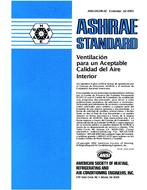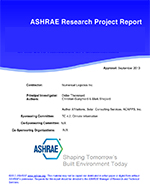A numerical study of thermal-hydraulic characteristics of turbulent flow between two parallel chevron plates is presented. Flow is incompressible and three-dimensional, and the effects of turbulence are simulated by Chen’s k-e extended turbulence model. The effects of three different corrugation inclination angles ß (ß = 20°, 40°, and 60°), relative to the main flow direction, are investigated in detail for inlet water velocity ranging from 0.5 m/s to 2.0 m/s. The numerical results for the streamline, isotherm, Nusselt number, and pressure coefficient are presented. It is shown that both the heat transfer coefficients and pressure drop are increased as the inclination angle is increased. A chevron plate with ß = 40° gives the largest flow area goodness factor (j/f). The numerical predictions of the heat transfer coefficient agree with the experimental data within 6% to 20%.
Units: SI
Citation: Symposium, ASHRAE Transactions, vol. 106, pt. 2
Product Details
- Published:
- 2000
- Number of Pages:
- 8
- File Size:
- 1 file , 600 KB
- Product Code(s):
- D-7286


